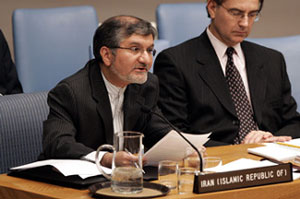- Text of Iranian President Ahmadinejad’s letter to President Bush (05-09-2006)
- Iranian ambassador sets the record straight (FCN, 04-07-2006)
- Nuclear hypocrisy in Iran’s treatment (FCN, 03-12-2006)
- How America crushed democracies (FCN, 08-28-2003)

UNITED NATIONS (FinalCall.com) – The United Nations Security Council was not able to reach agreement during their series of meetings held March 5-8 that attempted to draft a stronger resolution that would stiffen the economic penalties against Iran for its refusal to end its nuclear energy program.
Back in December, the Security Council passed what diplomats called “mild sanctions,” and there are banking sanctions that, according to newspapers such as the pro-Israeli New York Sun, have eroded Iran’s credit standing, and demand that Iran not have access to imported refined petroleum.

While Iran exports oil, it imports 40 percent of its fuel from other nations, according to press reports.
Undersecretary of State Nicholas Burns led the U.S. negotiating team and on Mar. 5, he told reporters at the UN Iran now stands “quite isolated” in the world community, but allowed that the offer to Iran to negotiate is still on the table. The NY Sun reported that American officials are saying that unilateral “measures” initiated by the U.S. Treasury Department against Iranian companies ‘have led to a growing unrest in Tehran.’”
The U.S. Congress has also entered the game of putting pressure on Iran to give up its nuclear ambitions. Reps. Ileana Ros-Lehtinen (R-Fla.) and Tom Lantos (D-Calif.) drafted legislation which would impose tougher unilateral American sanctions.
In the corridors of the UN, discussions center on France’s push for a tough arms embargo, which Germany, who has been allowed in the P-5 negotiations (the permanent five members of the Security Council, U.S., France, China, Britain and Russia), because of its extensive business dealings with Iranian companies. Russian diplomats have told reporters that they would block such a measure. However, there are indications that the Security Council is leaning towards putting into play strict travel restrictions against all Iranian officials involved in its nuclear program, as well as new banking and economic measures.
The NY Sun says that Israeli officials want “economic sanctions with real teeth.” Western nations still claim that Iran wants to build nuclear weapons, while Tehran continues to argue that they need nuclear energy for peaceful purposes only.
On Mar. 7, an op-ed writer for the Tehran Times called on Iranian officials to use “efficient diplomacy.”
“The West has never been pleased about Iran’s 1979 Islamic Revolution and its independence and has used every dirty trick in the book to undermine Iran’s development and prevent Iranians from achieving their goals,” stated the writer.
Noam Chomsky, noted linguist, author and foreign policy expert, in a recent interview with Foreign Policy In Focus, echoed the same sentiments as the editorialist. “Iran is independent and independence is not tolerated. Iran has defied the United States,” Mr. Chomsky said.
“The Iranian issue I don’t think has much to do with nuclear weapons. The point in the Middle East is oil,” he stressed. He continued: “An axiom of U.S. foreign policy is that it must control Middle East energy resources.”
Another op-ed piece, this time in Islamabad’s publication The Nation, called on the reader to understand that “Washington laid the foundation of Iran’s nuclear program in the 1960s.”
“In 1967, the U.S. supplied the Tehran Nuclear Research Centre, a five-megawatt pool-type nuclear research reactor. The Massachusetts Institute of Technology signed a contract with Tehran in 1975 to provide training for Iranian nuclear engineers. In 1977, Tehran purchased eight nuclear reactors from the U.S. for generating electricity. Then on July 10, 1978, the final draft of the U.S.-Iran agreement was signed,” writes the editorialist.
The writer says that it is easy to note how American “policies change” with the shift of “their interests.”
“Now the same U.S. that lent every kind of support to Iran’s nuclear program, is not ready to accept Iran’s right to enrich uranium for the peaceful purpose of generating electricity,” the writer stressed.
Lastly, a former French prime minister, writing in Vienna’s Der Standard newspaper, stated that Iran may not be looking to construct nuclear weapons. “Negotiations with Iran should be taken up, which would include an accurate assessment of the sincerity of Tehran’s official stance,” he said.












